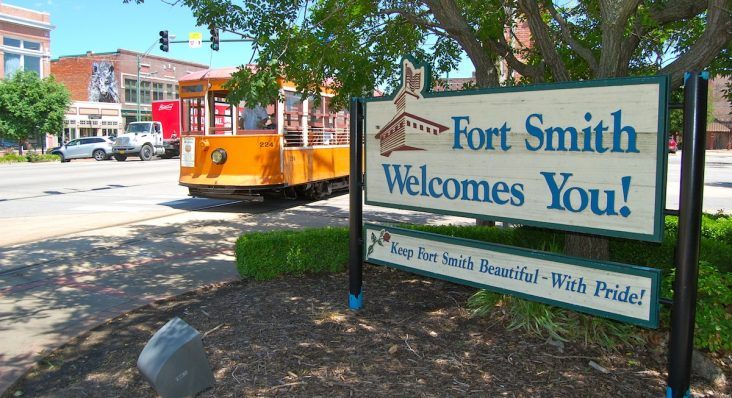CBID moves forward with assessment plan, could begin process in 2021
by April 21, 2020 4:11 pm 1,149 views

The Central Business Improvement District commissioners voted Tuesday (April 21) during its monthly meeting, which was held via Zoom, to move forward with steps that could lead to an assessment on properties in downtown Fort Smith.
The commission voted Aug. 20 to proceed with plans for property assessment within the district, a move they hoped would allow the board to do more things to improve the downtown area of Fort Smith. But before an accurate idea of how much could be raised by an assessment can be garnered, the commission needs to know the value of the land parcels in downtown.
There are 470 individual parcels in the CBID. Of those, 115 are exempt and have no value assigned to them. These include properties owned by governments, non-profits, churches, etc., according to information in the CBID meeting package.
The commission voted in December to seek a valuation of the exempt properties. In January, Deputy City Administrator Jeff Dingman, Bill Hanna, CBID commission chair, and Michelle Allgood, the attorney working with the CBID on the assessment question, met with Sebastian County about obtaining an assessment on the values of exempt properties.
Total Assessment Solutions (TAS), Sebastian County’s contracted third-party appraisal partner, said they could do the assessments for $20,125.
“We knew people would want to know what their number was, so this is a preliminary step. Until we gather the information and the district has the information about the nonprofits, you can’t really complete the formula,” Allgood said.
According to state law, there are two types of assessments that can be levied against real property inside a city’s improvement district – a project/improvement-specific assessment, levied to fund a “specific ‘plan of improvement,’” or a supplemental annual assessment to be used for ongoing operations or maintenance activities, Dingman said in a memo to the board dated Aug. 16.
Hanna said the Fort Smith CBID is one of the few in the state not funded by an assessment. Based on property valuations as of July 28, each 1-mill assessment on properties within the CBID would amount to $38,834.47 in annual operating revenue, Dingman said. An 8-mil assessment would mean approximately $310,657 in annual funding for the district.
Before an assessment can be levied, more than 50% of property owners in the district must sign a petition agreeing to an assessment. The CBID commission would then present that petition and the plan to the Fort Smith City Board of Directors. Dingman said under the state law if the CBID has the required signatures on the petition, the city’s BOD would be compelled to approve the assessment as an ordinance.
Dingman told CBID members that a cost to value all of the exempt parcels needs to be established by about July 1 to give plenty of time to create and circulate the petition.
“For scheduling purposes, if the intent is to start collecting assessments in 2021, an ordinance would have to be presented to the city Board of Directors for adoption no later than their Nov. 17 meeting,” Dingman said in a memo to the CBID commission. “That means all appraisals need to be done to establish an overall valuation, and then the petitions need to be drafted, circulated and verified before such ordinance can be presented to the board.”
The CBID voted unanimously Tuesday to fund pay TAS to complete the valuations, though Commissioner Richard Griffin, said he would like the commission to request the Sebastian County Quorum Court to fund the valuation of the 115 parcels. Payment would not be due to TAS until Dec. 31, which would allow time to approach the quorum court, Allgood noted. It was also noted, that the CBID could be reimbursed the cost to TAS through funds raised from the assessment if it is approved.
Commissioner Lee Ann Vicks wondered about the success of getting more than 50% of downtown property owners to sign the petition for the assessment giving the economic climate caused by the current COVID-19 pandemic, a concern many on the board seconded.
“I have a big concern, but we will never know until we do it,” said Phil White, “So do we sit back in fear, or do we move forward? We ought to go ahead and make the investment, we’ve got the money and if we do get through, then we can do the things we’ve talked about for years.”
The CBID commission plans to use monies garnered from an assessment to fund an ambassador program that would hire off-duty police officers as part of a Safety and Security program for downtown. That program would cost about $136,000 annually, according to a proposed operating budget. The assessment would also fund a Green and Clean project that would include streetscape maintenance and landscaping, which could incorporate care of flowerbeds as well as pruning and possible replacement of trees, cleaning and repairs to benches, lighting and trash receptacles, litter control, conversion of lights along Garrison Avenue to LED and more, Dingman said.
